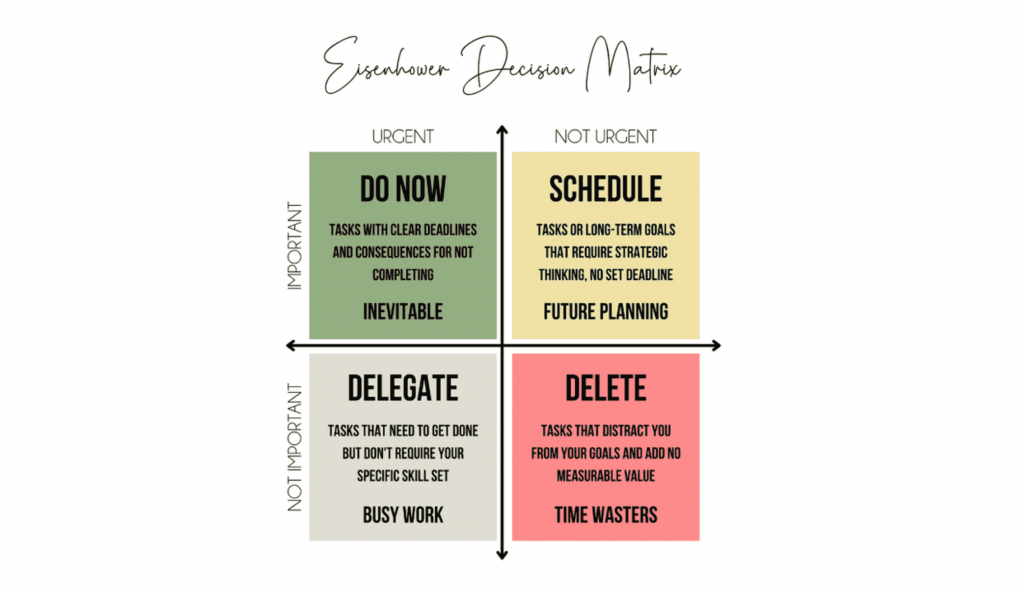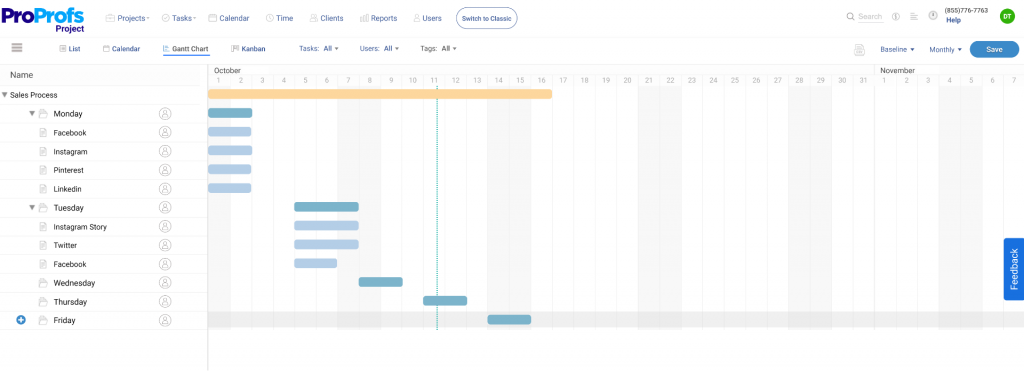When its come to Task Management Tips, Tasks are the fundamental blocks of a project, and I guess we all are aware of that.
But, what most of you might be struggling with is not being able to manage tasks and deliver within the deadlines. And chances are you don’t want that last-minute rush – I get it.
Talking about last-minute rushes, I think two main reasons why it happens are because –
- You have a huge backlog of pending tasks or
- There’s a sudden surge in the incoming number of new tasks
Either way, it’s hard not to lose control unless you have expert-suggested task management tips at your fingertips. Yes, you guessed it right!
9 Proven Task Management Tips
I spent the last few months conversing with multiple project managers and team leaders to explore various strategies and solutions they adopt when managing tasks.
The following nine tips below are based on that. I also added some examples for you so that it becomes more relatable for day-to-day usage.
1. Prioritize Your Tasks
Let’s start with the basics – not all tasks are equal. Distinguishing between tasks that are urgent and those that are important is the first step toward efficient task management.
I use the “Eisenhower Box” or the “Eisenhower Matrix” technique to categorize tasks into four quadrants –
- Quadrant 1: Urgent and important
- Quadrant 2: Important but not urgent
- Quadrant 3: Urgent but not important
- Quadrant 4: Neither urgent nor important

(Image Source: LinkedIn)
To use the Eisenhower Matrix, you can list down all tasks and assign them to one of the four quadrants. Then, you can plan your day or week based on the order of priority:
Quadrant 1 > Quadrant 2 > Quadrant 3 > Quadrant 4
This way, you will be able to focus on the most important and urgent tasks first and then move on to the less important and urgent ones.
2. Break Down Tasks Into Smaller Chunks
Large projects can appear intimidating, making it harder to meet deadlines. To counter this, break down tasks into smaller, manageable subtasks.

Breaking down tasks helps you to –
- Reduce the complexity and difficulty of the task
- Increase motivation and confidence by achieving quick wins and progress
- Estimate the time and resources needed for the task more accurately
- Track and monitor your performance and quality more easily
- Identify and resolve issues and risks more effectively
To break down tasks, you can use the Work Breakdown Structure (WBS) technique. It is a hierarchical diagram that shows the breakdown of a project or task into smaller components.
Here’s an example of how WBS will look for an event like a holiday party –
As you can see from the image above, using the WBS structure, you can categorize the smaller tasks into several departments. This makes it easier to complete them without any complexity or losing track of certain subtasks.
3. Utilize Task Management Software
If you’re wondering how to manage tasks while collaborating with your team, planning resources, and setting dependencies – you definitely need a task management software solution.
A professional software platform like ProProfs Project can help you –
- Create tasks and subtasks and assign them to your team
- Set and manage deadlines, priorities, and dependencies
- Monitor task progress and performance and measure results
- Coordinate with the team and stakeholders and share files and feedback
- Integrate with other tools and platforms, such as email, calendar, or cloud storage
- Visualize tasks and projects in different views, such as lists, Kanban boards, calendars, or Gantt charts
Investing in a project management software solution is crucial for streamlining your workflow. Choose a reliable software vendor that offers the features you need at an affordable price point.
4. Set Clear Deadlines
If you find this relatable, then probably your team isn’t doing it right. And if that’s the case, chances are that they may not have a lucid understanding of what’s on their plate.
In other words, setting clear, realistic deadlines for each task is crucial. I make it a point to communicate these deadlines to everyone involved, ensuring that we’re all fighting for the same goal.
To set clear deadlines, the following steps may help:
- Be realistic and reasonable: Don’t set deadlines that are too tight or too loose, as they can cause stress or complacency.
- ProProfs Project’s resource management feature is exactly what you need here to consider the complexity of the task, the availability, and the capability of the team.
- Be specific and measurable: Avoid setting deadlines that are vague or ambiguous. Use precise dates/times, and quantify your deliverables.
- For example, instead of saying, “We need the report ready by next week,” say, “Please submit the report by Friday, February 16, at 5:00 PM, and it will contain 10 pages and 5 charts”.
- Be ready for slight delays: Incorporate buffer time when setting deadlines to account for unforeseen issues that may arise. This practice helps in setting expectations and planning the workflow to meet these time constraints without unnecessary stress.
5. Communicate With Everyone Effectively
Needless to say, without effective team communication and collaboration, completing tasks before deadlines is an uphill battle. That’s why you should look for professional project management software, where you can –
- Set up teams
- Comment on tasks
- Tag/mention team members
- Share files
- Automate notifications through email
Effective communication means maintaining open lines of communication with team members, clients, and stakeholders. Clearly articulate expectations, ask for feedback and provide regular updates.
6. Delegate Tasks Wisely
No matter how important the project is, it’s always a better idea to share the workload with team members and avoid the I’m-going-solo approach. Why?
Because one of the best task management methods is to tap into the collective strengths of your team. It gestures that you trust them to execute their tasks with autonomy and ask for support when needed – much like screaming around in the office –
Here are some quick steps on how you can delegate tasks –
- Identify the tasks that can be delegated: Usually, tasks that are routine, repetitive, or low-priority, or ones that can be done faster by others should be delegated.
- Choose the right person for the task: Delegate tasks to people who have the skills, knowledge, experience, and availability to do them well.
- Communicate the task clearly: To ensure optimum results, explain the task to the person and set a realistic deadline, along with the expectations of the task.
- Monitor and provide guidance: Avoid micromanaging the person’s work, but check in regularly to offer assistance and guidance.
7. Review & Adjust Plans Regularly
Flexibility is key in task management. Regularly reviewing and adjusting your plans allows you to respond to changes and challenges proactively.
This iterative process can help you refine strategies, reallocate resources, and reprioritize tasks to ensure alignment with your goals. It’s about being agile, learning from each phase, and continuously improving your approach to task management.
So, how do you do that? These task management tips will provide a basic idea –
- Set and track key performance indicators (KPIs): KPIs like completion rate, quality score, customer satisfaction, or revenue help you measure progress and performance. You should set SMART (Specific, Measurable, Achievable, Relevant, and Time-bound) KPIs for tasks and track them regularly.
- Conduct periodic evaluations: Involve your team and stakeholders in periodic reviews and evaluations and solicit their feedback. Compare the actual outcomes with your expected results and identify discrepancies.
- Implement corrective and preventive actions: Corrective actions such as revising plans, reallocating resources, or changing methods help you resolve issues. Preventive actions mean avoiding any potential issues by updating risk assessments, implementing contingency plans, or enhancing communication.
8. Manage Your Time Efficiently
Knowing how to efficiently manage time is one of the integral task management skills most people struggle with. Effective time management means making schedules for each job and knowing when they start and finish.
But, here comes the question – HOW?
Well, I have two suggestions for you –
Suggestion 1: Get a project management tool that has built-in time-tracking capabilities. I like the way how ProProfs Project lets me set clear start and end dates for tasks. I can also create a project timeline, estimate task duration, and check if they fit with the project requirements.

Suggestion 2: Employ techniques like the “Pomodoro Technique” or time blocking. This not only optimizes your time management efforts but also helps you dedicate sufficient time to tasks without falling prey to burnout.
- Foster Collaboration & Feedback
“Talent wins games, but teamwork and intelligence win championships.” – Michael Jordan.
One of the task management tips I keep hearing from project managers and team leaders is always relying on team collaboration and feedback. So, why it’s important?
I talked about this a bit in the task delegation point above. Encouraging teamwork and having open feedback channels can largely boost work quality and speed. That’s because employees feel more valued when their feedback is heard and suggestions are incorporated.
Internal collaboration can be best achieved by using a task management tool where employees can communicate and work together. And for feedback, the best thing to do is to get a software solution that lets you create surveys and forms.
Manage Tasks Like a Pro With the Best Software
As a project manager or a team leader, you understand the consequences of poor task management. It’s not something you can evade once it starts derailing from its track. The solution?
Invest in professional task management tools. That’s one of the most common task management tips you’ll hear no matter which blog you read next. Personally, I’d recommend you to try ProProfs Project, which also happens to be the one I’ve been using for more than a year.
What I like the most is its easy-to-use task management tool. It has a no-frills UI with key features like collaboration, task progress monitoring, insights, and more. Setting a team and managing deadlines and assignments are also pretty easy.
But, regardless of which software you choose, never forget to test it before investing capital.
Testing the software means using its free trial or free plan first. For example, ProProfs Project offers a 15-day free trial with all features included. If you’re looking for an easy-to-use project management software to manage tasks, you can try it free by clicking here.
FREE. All Features. FOREVER!
Try our Forever FREE account with all premium features!





